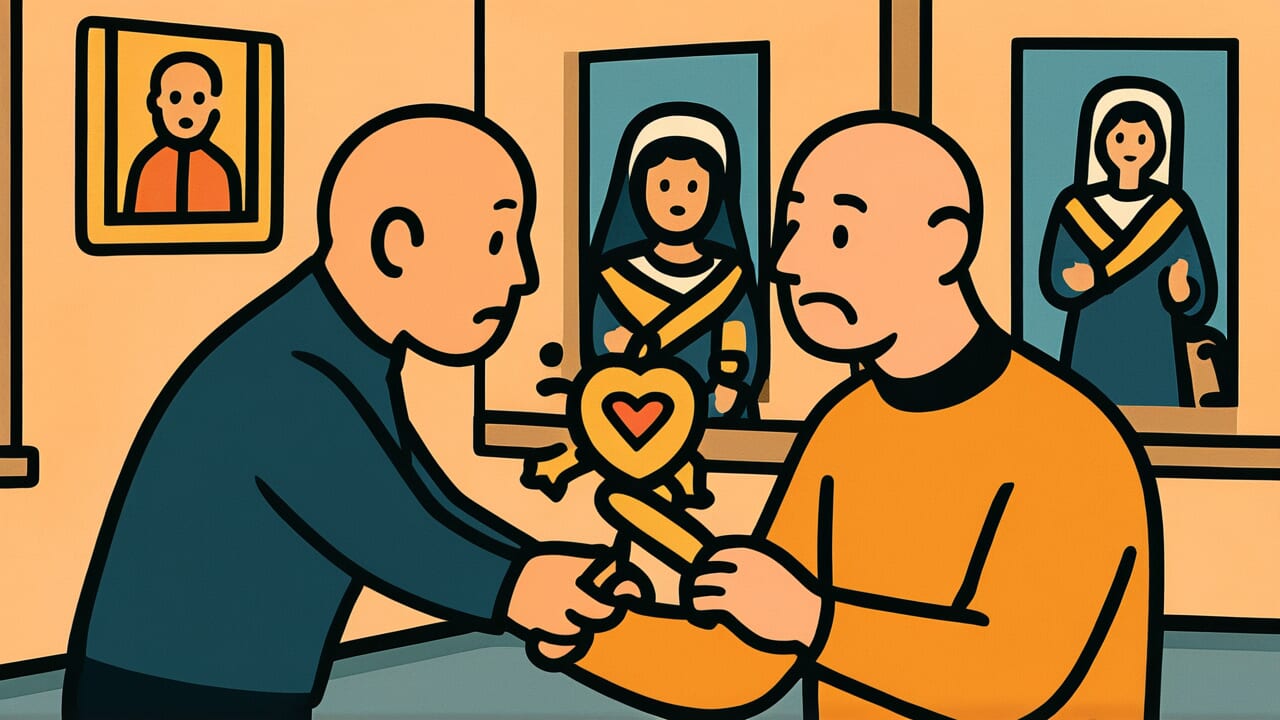How to Read “Even when the head goes bald, flirtation doesn’t stop”
Atama hagete mo uwaki wa yamanu
Meaning of “Even when the head goes bald, flirtation doesn’t stop”
This proverb describes a fundamental aspect of human nature. Even when people grow old enough to lose their hair, their interest in romance and attraction to others doesn’t simply disappear.
The saying points out that while the body ages on the outside, romantic feelings and interest in the opposite sex remain much the same as in youth. This reveals something essential about human nature.
People mainly use this expression to describe older individuals who still show interest in romance just like they did when younger. It often carries a slightly ironic or humorous tone.
The proverb gets quoted when highlighting how deep human desires run.
Even today, people understand this saying when expressing the gap between aging and inner desires. Though someone may look old on the surface, their fundamental desires don’t naturally fade with age.
This represents a universal truth about human nature.
Origin and Etymology
The exact first appearance of this proverb in literature remains unclear. However, scholars believe it emerged from common people’s culture during the Edo period.
The structure of the phrase is quite interesting. It contrasts “even when the head goes bald,” a symbol of physical aging, with “flirtation doesn’t stop,” representing human desire.
In Japan since ancient times, hair has symbolized youth and vitality. For men especially, thinning hair served as one of the clearest signs of aging.
Despite this visible aging, interest in romance doesn’t fade. The proverb expresses this observation with a touch of irony.
The Edo period saw the flourishing of townspeople’s culture. This era nurtured a culture that spoke frankly about human desires and true feelings.
In rakugo storytelling and senryu poetry, romantic affairs of older people became popular subjects. This proverb likely emerged from such keen observations of common people.
The word “uwaki” (flirtation) itself appears in records from the Edo period. It was already established then as a term describing a fickle heart in romantic relationships.
The wisdom of ancestors who sharply understood human nature is condensed in these few words.
Usage Examples
- That company president is over 70, yet his eyes light up around young female employees. It’s truly “Even when the head goes bald, flirtation doesn’t stop.”
- “Even when the head goes bald, flirtation doesn’t stop” is well said. My grandfather is over 80 and apparently fell in love at his care facility.
Universal Wisdom
The truth this proverb speaks offers deep insight into human desire, reason, and the relationship between body and mind.
We tend to think that as we age, we naturally calm down and youthful passions fade away. But actual human beings aren’t that simple.
The body definitely ages. Hair thins, physical strength declines, and outward appearance loses its youth.
However, inner desires and emotions don’t necessarily change at the same pace as the body. Many people still feel young inside.
This gap between inner and outer reveals the complexity of human existence.
This proverb has been passed down through generations because it touches on a fundamental human contradiction. Even when reason says “I’m too old for this,” emotions and desires don’t obey reason’s control.
Humans are both logical and instinctive beings at the same time.
Our ancestors observed this fact without criticism or glorification. They simply stated it as it is.
You can sense deep human understanding and a kind of tolerance in their words. The wisdom here accepts imperfect human nature with humor.
When AI Hears This
Humans tend to choose small immediate pleasures over large future losses. This is called hyperbolic discounting.
For example, even when a loss of one million yen is predictable in a year, people prioritize today’s 10,000 yen pleasure.
Research shows humans discount rewards one week away by about 30 percent. But rewards one year away get discounted by over 70 percent.
The risk of family collapse from discovered infidelity is “distant future,” so the brain treats it as extremely light.
Even more interesting is the mechanism that doesn’t recognize aging and hair loss as sunk costs. Normally sunk costs refer to invested money or time.
Here, “lost youth” fits that category. Rationally speaking, when attractiveness decreases, one should avoid risks more.
Yet the human brain excludes past aging from decision-making materials. Instead, reversed logic like “I’m not young anymore, so I should act now” actually kicks in.
Behavioral economist Dan Ariely’s experiments showed that sexually aroused subjects had up to 25 percent lower rational judgment than normal.
In other words, flirtation is a phenomenon where hyperbolic discounting and sunk cost ignorance maximize simultaneously. It’s concentrated human irrationality.
Lessons for Today
This proverb teaches us the danger of viewing people one-dimensionally. Judging people only by age or appearance, deciding “they’re too old for that,” means overlooking human complexity.
The same applies to yourself. While aging brings losses, inner richness and emotional depth exist on a different dimension from age.
You don’t need to confine yourself unnecessarily within the “age-appropriate” boxes society imposes.
At the same time, this proverb teaches the importance of self-awareness. Rather than denying desires and emotions within yourself, understand them and face them appropriately.
It suggests the importance of living while balancing reason and emotion.
Humans aren’t perfect. We carry contradictions, and sometimes reason and emotion conflict. But that’s exactly what makes us human.
It’s proof we’re alive.
This proverb teaches us to accept our imperfect selves while also understanding others’ complexity with tolerance. Don’t you think that’s the real message here?



Comments